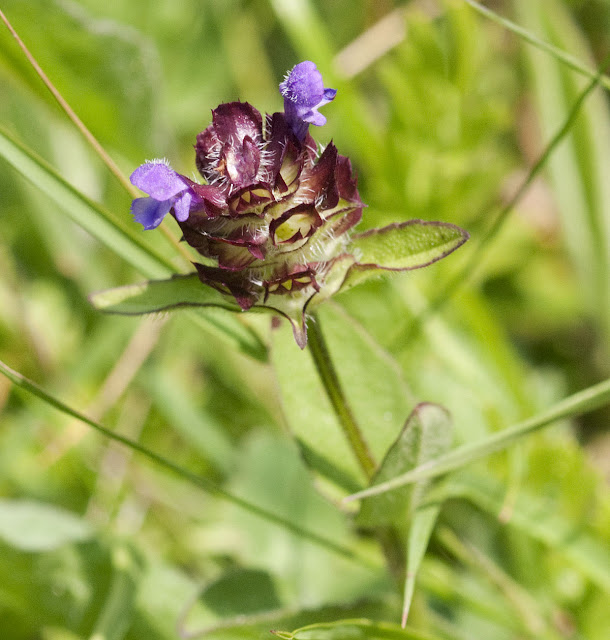 |
| Immature flower head of wild teasel, Dipsacus fullonum. Jubilee Country Park, 11 June 2011. |
This walk was led by John Bruce, assisted by Esme, and the first thing we did was look around the car park. Flowers of hedgerows and verges usually turn up in such places, and we found quite a few, such as stinging nettles, brambles, field buttercups, wood avens, creeping cinquefoil.
You might think that some of these are nuisances rather than desirable wildflowers, but nettles and brambles are excellent supporters of insect life and are very desirable for biodiversity.
John gave us a list of 80 plants that we might see in flower. I didn't realise it at the time, but when I got back I looked over the list and realised I had seen all but a handful, though a few were not actually flowering. I saw several plants that were new to me, though most of these are clearly common in this area as no-one else was surprised to see them.
 |
| Azure damselflies, Coenagrion puella, near Ray's Pond. Female above, male below. Jubilee Country Park, 11 June 2011. |
This park is famous (among botanists) for its corky-fruited water dropwort, a rare plant in this part of England, but becoming more widespread now by accident. When these meadows have been mown, the machinery has picked up seeds and moved them to other local grasslands. I saw some on Keston Common not long ago. The plant is a small white-flowered umbellifer, rather like a dainty hogweed; nothing like as pretty as the blue chicory which is the park's emblem.
In the grass were large and lush clumps of yellow rattle, which I last saw as small single stems in Darrick Wood meadow. (Later addition: I have since found out that the Jubilee plants are the greater yellow rattle, Rhinanthus angustifolius, so no wonder they were bigger.) It's interesting to see how apparently similar environments actually allow different groups of plants to flourish. I saw agrimony and red bartsia and all-heal, all new to me.
One meadow had several species of tare and vetch, and here there were also some rather small specimens of common spotted orchid. Everyone is proud of having orchids.
In the hedges were two similar plants of the dead-nettle group; black horehound and hedge woundwort. They both look like nettles and have smallish purple flowers. I am learning plants at a great rate, and I can now tell these two apart conclusively.
 |
| Curled dock, Rumex crispus, by Ray's Pond in Jubilee Country Park. 11 June 2011. |
Ray's Pond was beautiful, as usual. It's a recently created pond. All its plants have been introduced, and they are a good selection. Currently, greater and lesser spearwort, relations of the buttercup, are in flower. I was also pleased to see a magnificent curled dock by the fence, its colourful seed head full of three-angled seeds.
There were several butterflies around. The only ones I saw close enough to identify were meadow browns. We also saw a splendid Five-spot Burnet moth, most likely the Narrow-Bordered species, which stayed still long enough for a good closeup photo, in which my ring flash shows up its iridescence.
I have omitted many plants so as not to just end up with a huge list. But the morning was full of learning in a pleasant environment, which is almost heaven. And I had another walk due in the afternoon ...
All the photos in this post were taken with my Canon EOS 450D camera with the EF 100mm macro lens.
More images:
 |
| Narrow-Bordered Five-spot Burnet moth, Zygaena lonicerae. Jubilee Country Park, 11 June 2011. |
 |
| Black horehound, Ballota nigra, in a hedgerow. Jubilee Country Park, 11 June 2011. |
 |
| Red bartsia, Odontites vernus. Jubilee Country Park, 11 June 2011. |
 |
| Selfheal, Prunella vulgaris. Jubilee Country Park, 11 June 2011. |
No comments:
Post a Comment